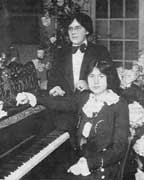Dissonance is Today, Consonance is Tomorrow by Nadia Boulanger
/ November 1, 2000
Version française...

First published in The Music Journal, May 1970.
Some people think that composers today are not so able to express their own individualities in what they write as the composers of other eras. Each period has similar virtues. In the whole history of France you have a common language, common technique, but personality emerges in an uncontrollable way–it is there. [...]
Some think the young composers of today try to avoid consonance. But what do we call consonance? You remember when Debussy was a little boy and the secretary of the Conservatory came to him and said, "Have you finished poisoning the ears of your friends with all this dissonance?" And Debussy answered and he was only 12 years old, "Oh Mr.Secretary, dissonance is today. Consonance is tomorrow."
Recently I was asked what I would do if one of my students brought me a "conventional" composition of great beauty. It depends on what you call conventional. Do you make a similarity between tradition and habit? I adore tradition. I cannot stand habit. Simply to repeat is nothing, also to destroy is nothing. Tradition is never interrupted, we are always evolving but never interrupted.
Beautiful music–beauty is outside any other question. There is a difference because nationalities create differences but no superiority. [...]
I was asked if the composer displays more imagination when he is able to write "descriptive" music. We don’t write descriptive music in general, we write only music. Whatever the form of music is, it is only a reason to reappraise the real meaning of music with external possibilities.
Is melody lost sight of in preference to dissonance in contemporary composition? Melody has nothing to do with dissonance or consonance. Melody is a line, always a line in music. I don’t believe we can ever speak on this. Every 50 years we hear about the death of theatre, and the theatre is perfectly well; it goes on, has never ceased to go on. But one speaks always of decadence because people do not accept the fact that music must evolve.
I am often asked how I teach. [...] I try to understand who they are. I try to help them, improve their techniques. [...]
It is different with each pupil, you cannot compare the development of one with another. You can say that they are equipped to do something or not equipped: and, on this equipment, one can have a certain control. But on nature, one can have no control.
If he is a born composer, he will be a composer. So if you teach people technique they may have the imagination, they may have the creative gift. That you cannot create, you cannot transform it.
Everything is moving constantly, nothing is motionless, nothing is settled. At the same time one must go through the methods, not a system, but the methods which develop a logical mind, a control of this mind, because this is absolutely necessary. Without method nothing can exist. First I believe in preparing a musician to be a good musician.
Someone asks, "Do you associate genius with initiative?" Those are wonderful words. A great mind said, "Talent without genius is a little thing but genius without talent is nothing." This is perfectly true. You have to know the language and if you have no language you can express nothing. And when you have a lot to express, you simply enjoy the language of everybody.
A student asks, "What are the advantages, if any, of private lessons or class lessons?" You can talk about composition in a class but you cannot really teach composition in a class. I am not sure one can give a class in composition. In a private lesson one can discuss a composition but when people are not ready, nothing can be done. When they are ready you can discuss a point, but you cannot make a composer if he is not a composer. You can give him a language, you can give him a means of expression, but then he must express himself.
[...] Then they ask, "How can you tell if someone is gifted?" You discover it very soon: in playing, in talking, in what he has done. You feel what his background is, what he knows, what he is thinking of. How can you recognize the spark in a composer? Fortunately, all that is worthwhile escapes through this control. We can’t define that with words. We do not know what is beauty, we do not know what is love. We only live under the light of what we know is essential, or nothing means nothing.
One can never train a child carefully enough. If you take general education, one learns to recognize colors, to recognize words, but not to recognize sound. […] Most people hear nothing because their ear has never been trained. And many musicians hear very badly and very little.
[…] Someone asked me, "Is there
anything in or about the world of music that could be improved?" We can
always improve, all our lives. They ask me questions as though I was a
prophet. I am only a poor teacher travelling hour after hour, trying to do
what has to be done, day after day
Version française... | 

